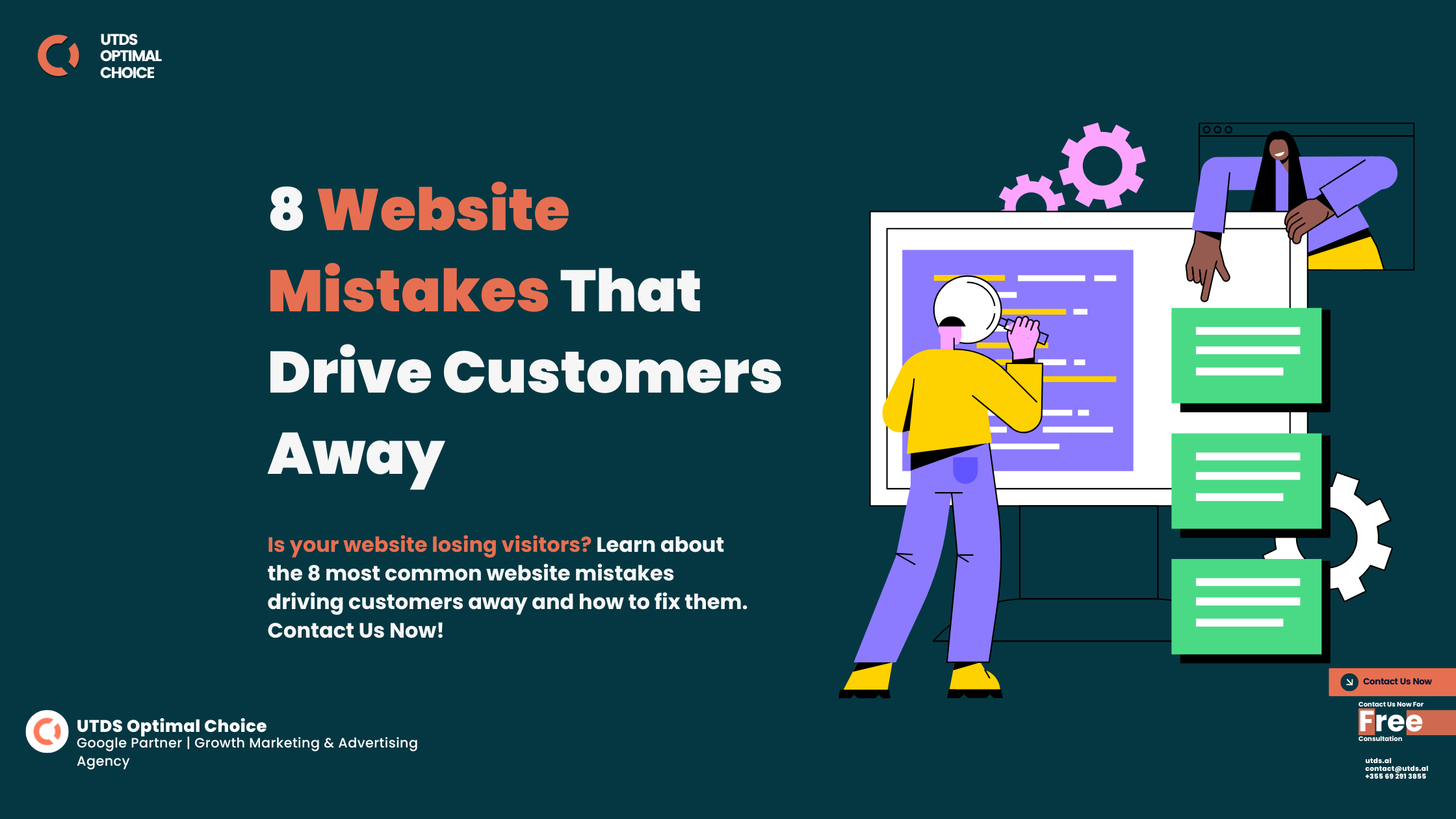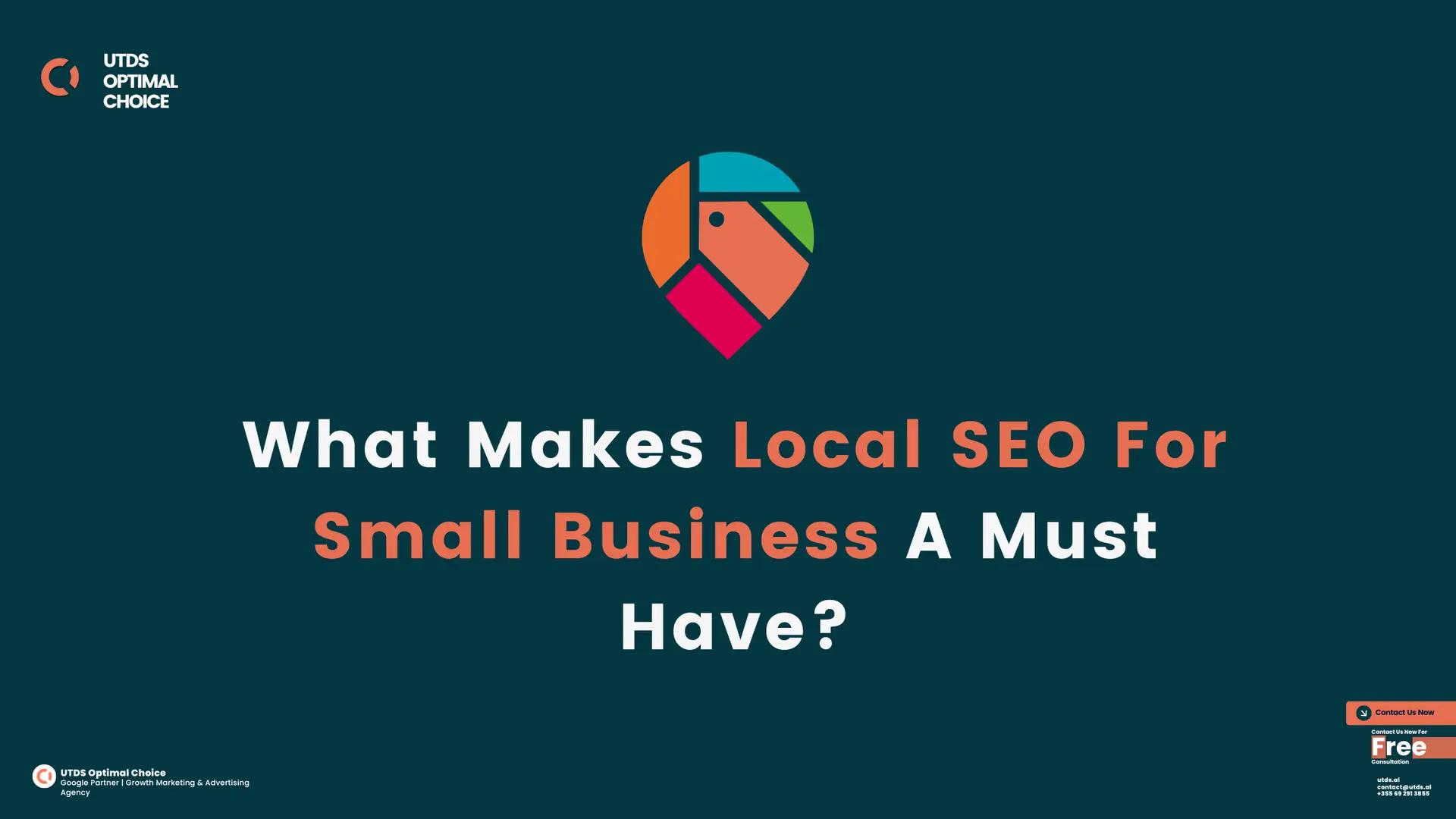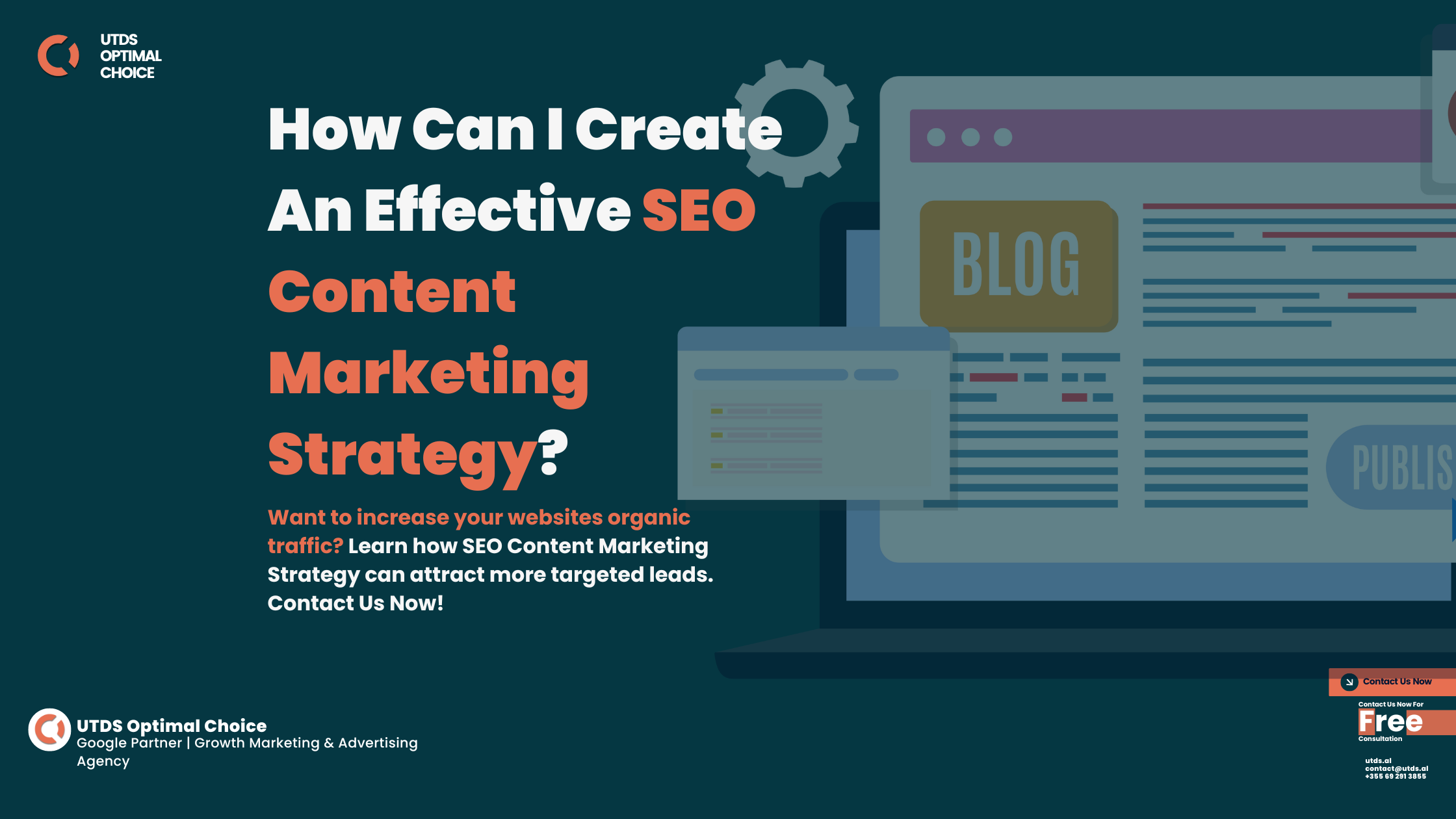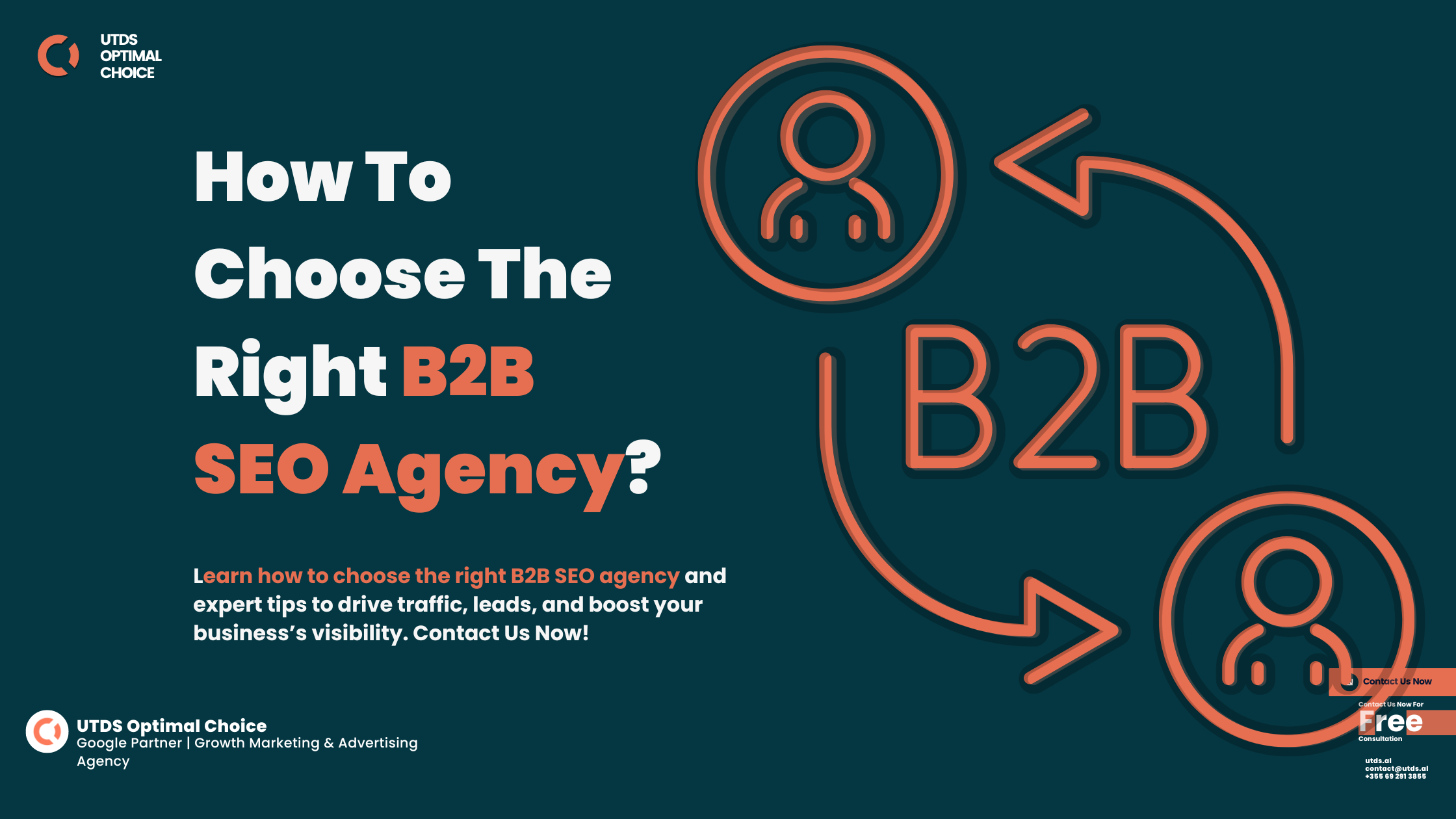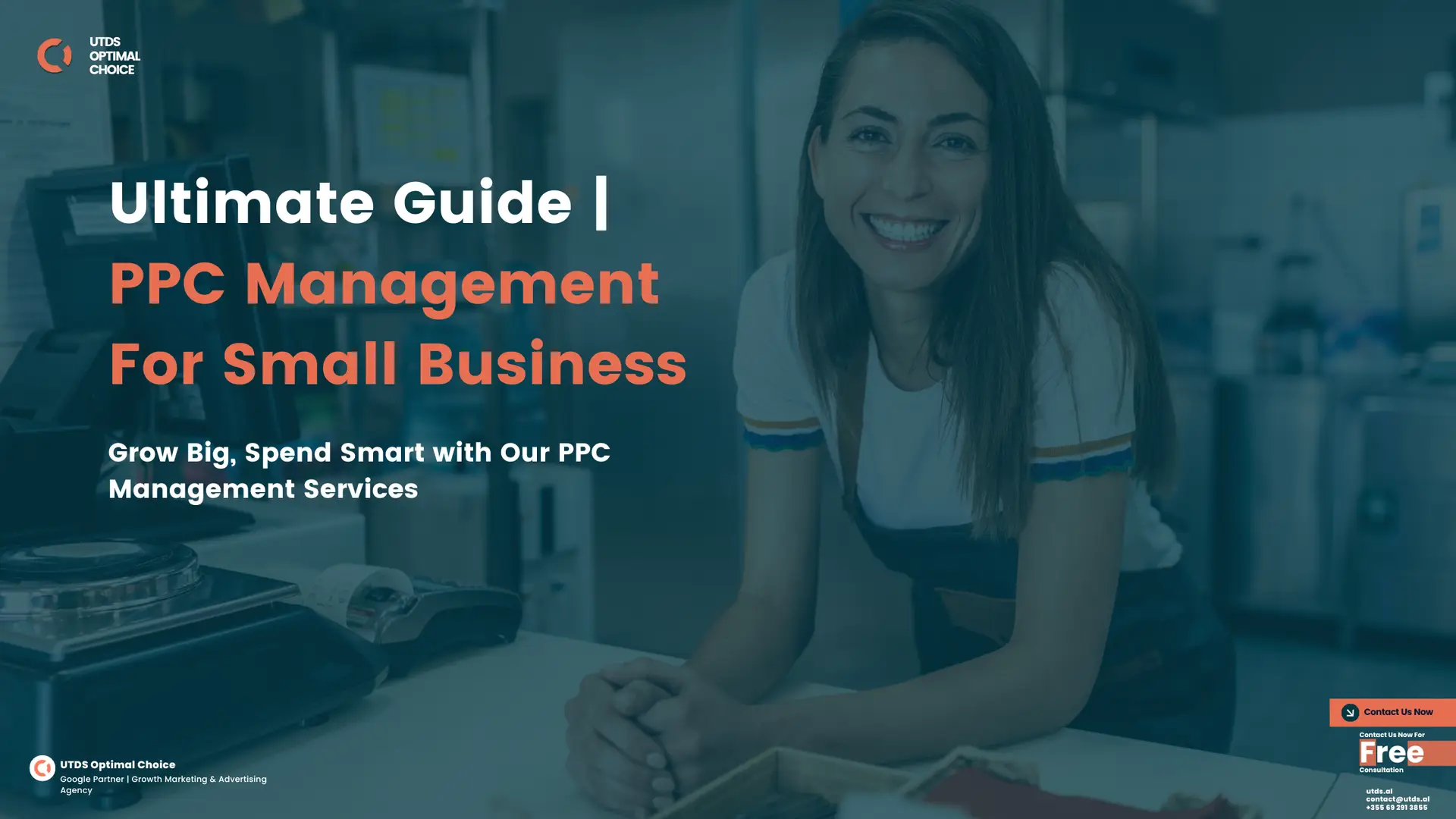Securing a top spot on Google search results is crucial for businesses aiming to thrive online. High rankings aren’t just about bragging rights – they translate into tangible benefits like increased visibility, more website visitors, enhanced credibility, and ultimately, higher sales and conversions. Let’s dive into the strategies that can help your website climb the Google ladder and stand out in the competitive UK market. Are you new to the business? How is the UK market treating you? Want to get a step ahead!! Check our startup marketing strategy guide to help you get started.
Reaching the top of Google search takes more than just keywords, it requires a strategic approach to SEO and PPC. At UTDS Optimal Choice, we specialise in creating customised plans that boost your website’s visibility and attract quality traffic. Our expert team knows what it takes to help your site rank higher, ensuring it stands out to the right audience. Contact us today for a strategy focused on driving real results.
What Are Google Ranking Factors
Think of Google’s algorithm as a sophisticated AI, constantly working to connect searchers with the most relevant and high-quality websites. Here’s what this AI cares about:
- Content Quality: Google loves well-written, informational search intent based content that answers users’ questions.
- Backlink Profile: Consider these as votes of confidence from other websites. The more reputable sites that link to you, the more Google trusts you.
- User Experience: This is about making your website a pleasant place to visit. Fast loading times, mobile first web design, and easy navigation are all part of rolling out the red carpet for your visitors.
- Technical SEO: Think of this as the behind-the-scenes work that ensures Google can easily understand and index your site.
UK-Specific Tip: If you’re targeting UK customers, consider using a .co.uk domain. It’s like having a local accent – Google.co.uk often gives these domains a little extra love in UK-based searches.
How To Get Your Website To The Top Of Google Search
Keyword research is like mining for digital gold. It’s about discovering the exact words and phrases your potential customers are using when they search for businesses like yours. Here’s how to strike it rich:
- Identify Seed Keywords: Start with the basics. If you’re a plumber in London, your seed keywords might be “plumber London” or “emergency plumbing services“.
- Expand with Long-Tail Keywords: These are the more specific phrases that might have lower search volume but higher conversion potential. For instance, “24-hour emergency plumber in North London” is more specific and likely to attract customers ready to hire.
- Analyse User Search Intent: Put yourself in your customers’ shoes. When someone searches for “best plumber in London“, are they looking to hire immediately, or just starting their research? Understanding this helps you create content that matches what users are really looking for.
- Use Keyword Research Tools: These are your trusty pickaxes in the digital gold mine:
- Google Keyword Planner: Free and straight from the source
- Ahrefs: Great for comprehensive keyword data
- SEMrush: Excellent for competitor keyword analysis
- Answer the Public: A goldmine for question-based keywords
- Consider Local SEO Keywords: For UK businesses, thinking local is crucial. Include location-based keywords like city names or regions to attract nearby customers.
Example: Let’s say you run a bakery in London. Your keyword list might look something like this:
- “Best artisan bakery in London”
- “Sourdough bread delivery East London”
- “Gluten-free cakes near me”
- “Traditional British pastries in London”
keyword research isn’t a one-time task. Keep refining your list as you learn more about your audience and as trends change.
On Page SEO Techniques
On page SEO is like dressing your website in its Sunday best before a big date with Google. Here’s how to make your pages irresistible:
Title Tags
Think of these as your page’s headline on the search results. They should be:
- Attention-grabbing
- Include your primary keyword
- Keep it under 60 characters to avoid being cut off
Example: “Award-Winning Plumber in London | 24/7 Emergency Services”
Meta Descriptions
This is your elevator pitch in the search results. Make it count by:
- Summarising the page content in 150-160 characters
- Including your primary keyword
- Adding a compelling call-to-action
Example: “Need a reliable plumber in London? Our award-winning team offers 24/7 emergency services. Call now for fast, professional plumbing solutions!”
Header Tags (H1, H2, H3, etc.)
Use these to structure your content like chapters in a book:
- H1 is your main title (use only one per page)
- H2s and H3s are for subsections
- Include keywords naturally in your headers
Content Optimisation
This is where you really get to shine:
- Create high-quality, original content that provides value to your readers
- Use your target keywords naturally throughout the text
- Include semantically related terms (LSI keywords) to show depth of coverage
- Aim for comprehensive coverage of the topic – be the go-to resource in your field.
- Always follow EEAT guidelines to create high quality content. Check here to know how to improve EEAT in content?
Internal Linking
Think of this as creating a roadmap for your visitors (and Google):
- Link to other relevant pages on your site
- Use descriptive anchor text that gives a hint about the linked page’s content
Remember, on page optimisation isn’t about stuffing keywords everywhere. It’s about creating a seamless, valuable experience for your visitors while giving Google clear signals about your page’s content. Want to know more about SEO Meta tags?
Technical SEO
Technical SEO ensures your website is in top shape for both search engines and users:
- Site Speed: Use Google’s PageSpeed Insights to identify and fix speed issues.
UK-Specific Tip: Make sure your hosting server has a good connection to the UK. - Mobile-Friendliness: With Google mobile first indexing, your site needs to look great and work well on smartphones and tablets. It’s not just about shrinking your desktop site – think about how mobile users interact with your content.
- Crawlability: Use robots.txt to guide search engines through your site. Think of it as making Google to follow and find all your important pages.
- Site Structure: Implement a logical site structure with a clear hierarchy. So it is easy for both visitors and search engines to find what they’re looking for.
- Schema Markup: This is to help Google understand between the lines of your website. Use structured data to help search engines understand your content better, potentially earning you those rich snippets in search results.
- XML Sitemap: Think of this as a map of your website. Submit it to Google Search Console to ensure all your pages are indexed.
Case Study: A UK e-commerce site put these techniques into practice and saw impressive results. They improved their page load time from 6 seconds to 2 seconds, resulting in a 20% increase in organic traffic and a 15% boost in conversions. It goes to show that sometimes, the ‘boring’ technical stuff can have exciting results!
Off Page SEO Techniques
Off-page SEO is all about building your site’s reputation in the wider web community. It’s like networking for your website. Here’s how:
- Content-Driven Link Building: Create content so good that people can’t help but link to it. Example: An infographic about “The History of Tea in Britain” could attract links from food blogs, history sites, and UK tourism pages. It’s interesting, shareable, and relevant to a wide UK audience.
- Digital PR: Get your business featured in online publications.
- Guest Posting: Write articles for reputable websites in your niche. It’s a way to share your expertise and get your name out there.
- Broken Link Building: Find broken links on other sites and offer your content as a replacement. It’s like being a helpful neighbour – you’re solving a problem for them while benefiting yourself.
- Local Citations: Make sure your business is listed accurately on UK business directories like Yell, Thomson Local, and FreeIndex.
- Social Media Engagement: While not a direct ranking factor, social media can increase your content’s visibility and indirectly lead to more backlinks. Think of it as word-of-mouth marketing for the digital age.
Content Marketing Strategy
Content marketing is your chance to shine as the expert in your field. It’s about creating valuable, relevant content that attracts and engages your target audience. Here’s how to create a strategy that works:
- Understand Your Audience: Create buyer personas to guide your content creation. What are their pain points? What information are they looking for? What style of content do they prefer?
- Content Types: Mix it up to keep things interesting and cater to different preferences:
- Blog posts
- Videos
- Infographics
- Podcasts
- Whitepapers
- Case studies
- Content Calendar: Plan your content in advance, considering seasonal trends and UK-specific events.
- Quality Over Quantity: Focus on creating comprehensive, valuable content rather than churning out short, superficial pieces. It’s better to publish one outstanding article a month than four mediocre ones.
- Promote Your Content: Don’t just create and hope for the best. Share on social media, engage with your audience, and reach out to influencers in your industry.
UK-Specific Example: A UK travel company could create a series of blog posts about “Hidden Gems in British Cities”, each focusing on a different location. This could be accompanied by Instagram-worthy photos and short YouTube videos, creating a multi-channel content campaign. It’s relevant, interesting, and highly shareable – the perfect recipe for content marketing success.
User Experience (UX) and SEO
User experience is becoming increasingly important in SEO. Google wants to send users to sites that not only have great content, but are also a pleasure to use. Here’s how to do so:
- Intuitive Navigation: Make it easy for users to find what they’re looking for. Think of your site like a well-organised shop – everything should be logically placed and easy to find.
- Fast Loading Times: Aim for page load times under 3 seconds. In the online world, every second counts.
- Mobile Optimisation: Ensure your site works well on all devices. With more and more people browsing on their phones, a mobile first website isn’t just nice to have – it’s essential.
- Clear Call-to-Actions (CTAs): Guide users on what to do next. Whether it’s “Buy Now“, “Learn More“, or “Contact Us“, make it obvious and enticing.
- High-Quality, Relevant Content: Provide value to your visitors. Answer their questions, solve their problems, and keep them coming back for more.
- Accessibility: Ensure your site is usable by people with disabilities. It’s not just good practice – it’s the right thing to do.
Case Study: A UK retail website put these principles into practice and saw impressive results. They improved their site structure and navigation, which led to a 25% reduction in bounce rate and a 40% increase in average session duration. This improvement in user engagement led to better rankings for their key product pages. It’s a great example of how focusing on user experience can have a positive impact on SEO. Want to know more about SEO? Check our complete beginners guide to SEO to know more.
Local SEO Strategies
For UK businesses targeting local customers, local SEO is your secret weapon. Here’s how to make sure you’re the first name that comes up when someone in your area is looking for your services:
- Google My Business: This is your business’s home on Google. Claim and optimise your GMB listing. Include photos, keep your business hours updated, and respond to reviews promptly. Think of it as your digital shopfront.
- Local Keywords: Sprinkle location-based keywords throughout your content and meta tags. If you’re a Manchester-based business, make sure potential customers know it.
- NAP Consistency: NAP stands for Name, Address, and Phone number. Make sure this information is consistent across all online platforms. It’s like making sure everyone has your correct contact details.
- Local Link Building: Get links from other local businesses, chambers of commerce, and community organisations. It’s like becoming an active member of your local business community.
- Local Content: Create content relevant to your local area. This could be guides to local events, resources for local issues, or spotlights on local attractions.
Example: Let’s say you run a restaurant in Manchester. You could create a “Foodie’s Guide to Manchester“, featuring your restaurant alongside other local culinary highlights. Partner with other local businesses to promote the guide, building relationships and earning links in the process. It’s a win-win – you’re providing valuable content for your audience while boosting your local SEO in UK.
Tracking and Measuring SEO Success
You can’t improve what you don’t measure. Here are the key metrics you should be tracking to ensure your SEO efforts are paying off:
- Organic Traffic: Use Google Analytics to monitor visits from search engines. Are more people finding you through search?
- Keyword Rankings: Track your positions for target keywords using tools like SEMrush or Ahrefs. Are you moving up in the rankings for important terms?
- Conversion Rate: Monitor how many visitors are taking desired actions (purchases, sign-ups, etc.). More traffic is great, but it needs to translate into business results.
- Backlink Profile: Keep an eye on the quantity and quality of sites linking to you. Are you earning links from reputable sites in your industry?
- Page Speed: Regularly check your site’s loading times. As we’ve discussed, speed matters for both users and search engines.
- Core Web Vitals: These are Google’s metrics for page experience. Monitor them in Google Search Console to ensure you’re providing a top-notch user experience.
Set up a monthly reporting system to track these metrics and adjust your strategy accordingly. SEO is not a “set it and forget it” task – it requires ongoing attention and refinement.
How UTDS Optimal Choice Can Help
We’re UTDS Optimal Choice, one of the most reputable and recognised Website Development and SEO Agency in the UK.
Our team of SEO experts can:
- Conduct a comprehensive SEO audit of your website, identifying quick wins and long-term opportunities
- Develop a customised SEO strategy tailored to your business goals and target audience
- Implement on-page and technical SEO improvements to make your site shine in Google’s eyes
- Create high-quality, SEO-optimised content that your audience will love (and search engines will rank)
- Build high-quality backlinks to boost your site’s authority and credibility
- Provide regular reporting and strategy adjustments to ensure you’re always on the right track
Contact us today for a free consultation and take the first step towards dominating the UK search results!






